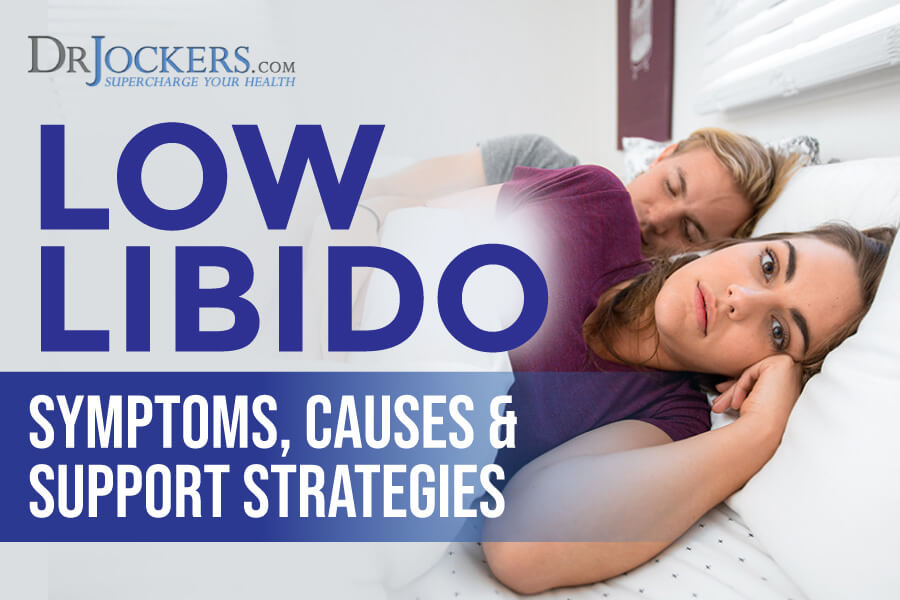 Low Libido: Symptoms, Causes, and Support Strategies
Low Libido: Symptoms, Causes, and Support Strategies
Your libido is your sexual drive and desire. It can be affected by a number of factors including your hormonal health, brain function, stress levels, mental state, and medications you may be taking. Low libido can be a sign of an imbalance or some physical or emotional issues. Low libido can lead to relationship and personal frustrations and interfere with your quality of life. The good news is that with the help of some natural support strategies, you can keep your libido healthy and happy.
In this article, you will learn what libido is. You will learn about the neurochemistry of healthy libido. You will understand the relationship between the cell danger response (CDR) and libido. I will go over the symptoms of low libido. I will explain the risk factors for and root causes behind low libido. I will offer my best natural support strategies for low libido.
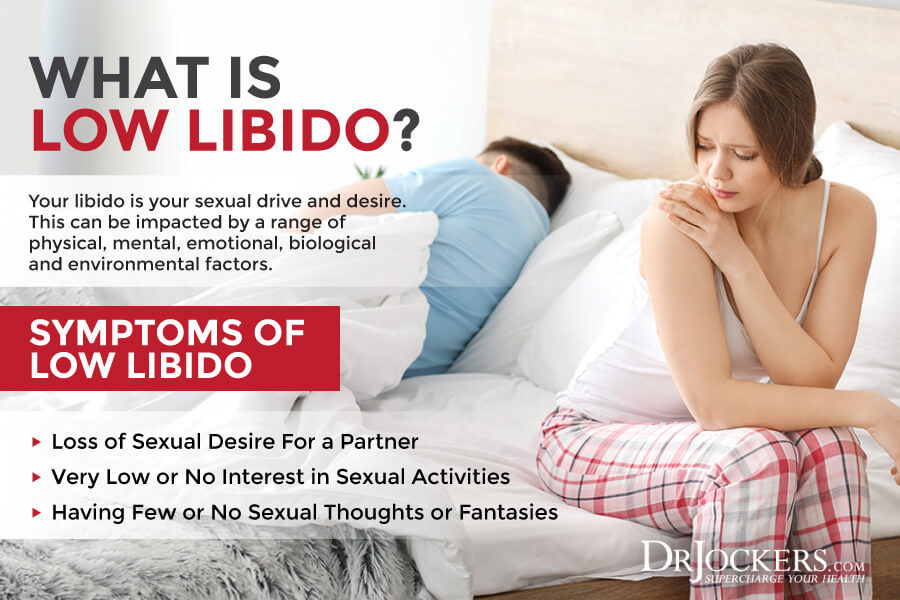
What is Your Libido?
Chances are, you’ve heard the term libido before. Libido refers to your sex drive, sexual desire, or sexual appetite. Your libido is determined by an array of internal ad external factors. It is affected by your brain health and brain function, hormonal health, and even your learned behaviors. It can fluctuate due to hormonal shifts, changes in your mental state, stress levels, and certain medications.
According to a 2019 research published in Brain and Behavior, the neural pathways of libido are similar in both males and females (1). They are affected by your cerebral, spinal, and peripheral components. Libido doesn’t only affect your emotional desire to have sex but supports your physical desire. In men, it allows blood to flow to the penis, which leads to an erection. In women, it allows the enlargement of the labia and lubrication, which helps more enjoyable intercourse.
Natural fluctuations in libido are normal. For women, their menstrual cycle may play a role in these fluctuations. For example, the days approaching ovulation are the days when most women experience the highest libido. This makes sense since this is around a woman’s fertile days.
However, while fluctuations are normal, you want your libido to be at healthy and normal levels. Low libido means lower or a lack of interest in sex, which can not only put a strain on your intimate relationship with your partner but can also affect your own mental, emotional, and physical well-being. Remember, it’s not just about sex. Low libido is a sign that something may be physically off.
On the other hand, overly high libido can become a problem as well. It may be a sign of a hormonal imbalance or neurological health issues. It can also put a strain on your relationship, your well-being, and your quality of life.
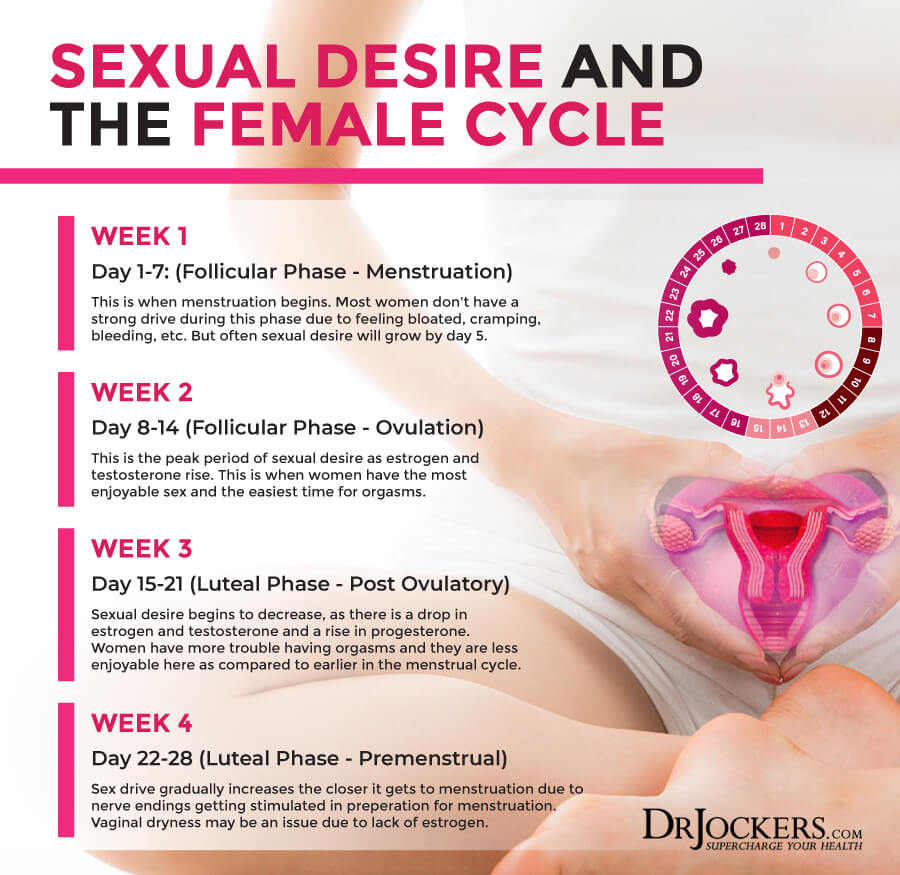
Neurochemistry of a Healthy Libido
If you want to understand libido, you have to understand the healthy neurochemistry of libido. When you hear the words dopamine and oxytocin, you probably think about your mood. According to a 2009 review published in the Journal of Sexual Medicine, they also affect your libido (2).
Dopamine is created by the hypothalamus in your brain. It plays a role in your brain’s reward pathways. When you are attracted to someone, high levels of dopamine get released. Dopamine can make you feel energetic, happy, and even euphoric. They also decrease insomnia and appetite. These are the chemicals that are responsible for ‘feeling in love and for the exciting honeymoon phase of a new relationship. It boosts your libido and supports the sexual connection.
Oxytocin is another chemical, hormone, and neurotransmitter that’s also called the ‘love hormone’ for good reasons. Oxytocin is linked to relationship-building, trust, empathy, love, and sexual activity. It is released during hugging and physical connection, as well as orgasms to increase pleasure. It is also released during childbirth and breastfeeding to support the connection and bonding between mother and child.
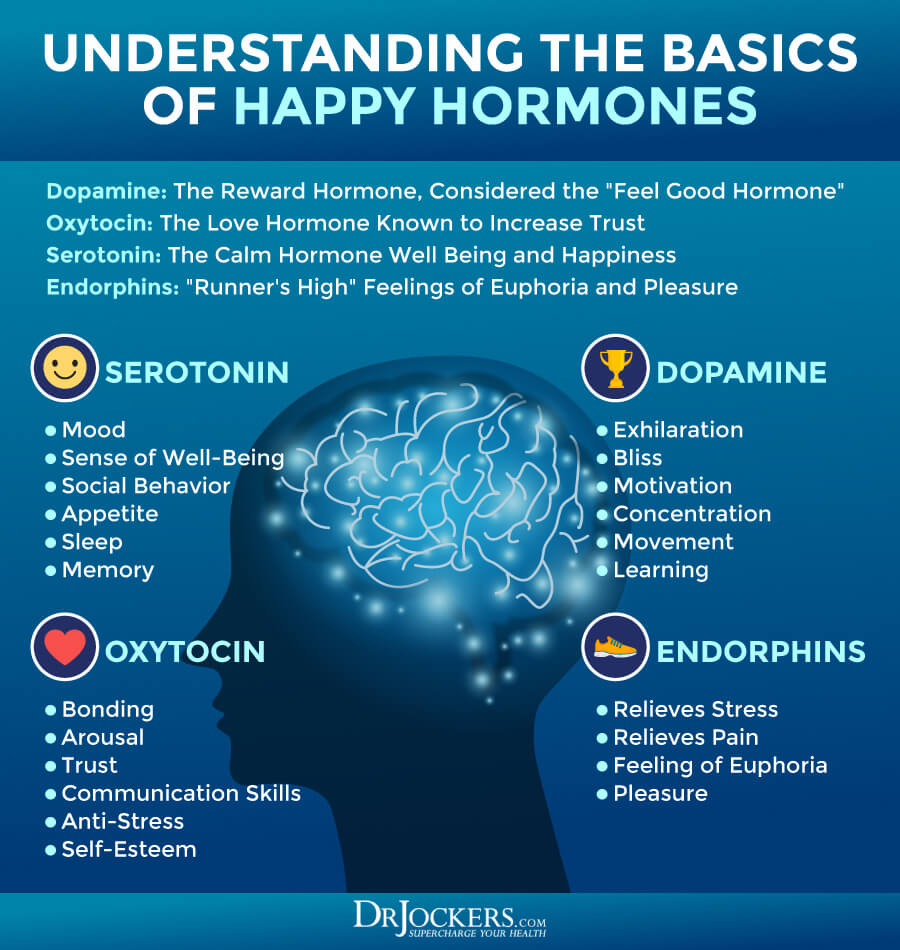
Besides dopamine and oxytocin, two sex hormones also play a role in libido. Estrogen is a female sex hormone produced by both male and female bodies. It plays a critical role in the female menstrual cycle. It helps to increase libido and to improve vaginal lubrication.
Testosterone is a hormone that is produced by the body of both males and females; however, its prominent in men. It is created in the testicles and affects a man’s sexual development, appearance, muscle strength, and bone mass. It is responsible for sperm production and a healthy libido. Low testosterone can lead to low libido and erectile dysfunction.
Prolactin is a hormone produced by the pituitary gland of both males and females. It is responsible for breast growth and milk production during pregnancy and after birth during the breastfeeding period (3).
In non-pregnant, non-breastfeeding women and men, prolactin levels are normally low. Too much prolactin can decrease testosterone and estrogen levels which can reduce libido and result in sexual dysfunction.
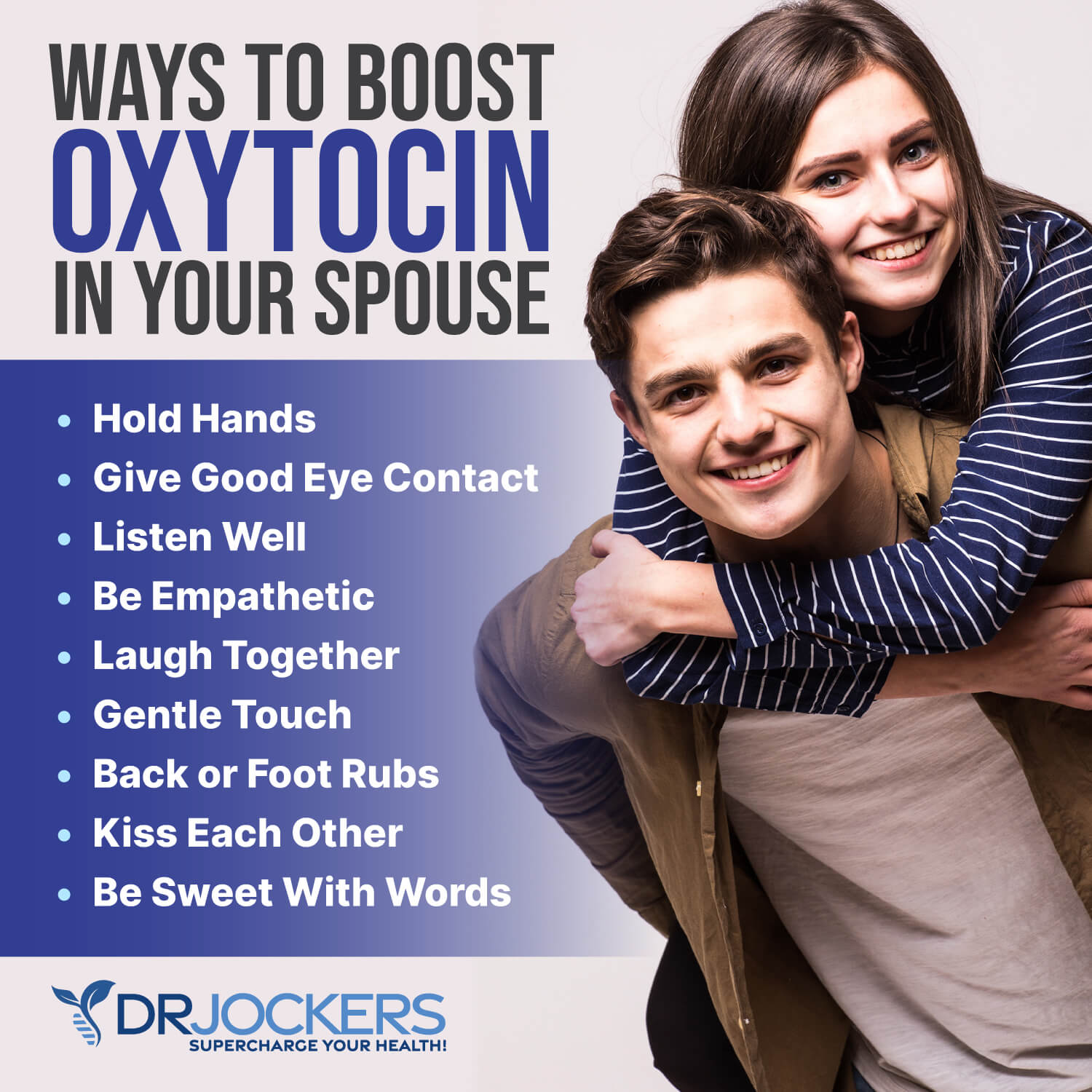
The Cell Danger Response and Low Libido
In functional medicine circles, there is a lot of talk about the cell danger response (CDR). A 2013 review published in Mitochondrion has described the CDR as a critical evolutionarily conserved metabolic response that is part of your body’s innate defense system (4). It protects your individual cells from cellular threat, danger, and harm. It doesn’t matter if the threat is physical, biological, or chemical. If it goes beyond your cell’s natural capacity to ensure homeostasis, it triggers a CDR.
Your body is a complex system of individual cells that work together to form tissues, organs, and other systems in your body. Each of your cells has several components, and the most important component of each cell is the mitochondria. Your mitochondria are responsible for creating energy from the food you eat to fuel and energize your cells, tissues, and organs.
Your mitochondria are critical for energy, function, and health. The mitochondria also act as energy sensors and cellular defense agents with one goal in mind: homeostasis or cellular balance. If there is a significant drop in this energy and there isn’t enough energy to meet the minimum requirement for homeostasis, your mitochondria will recognize this energy drop as a threat to your health and balance. Stress, past trauma, infections, and other health issues are common sources of threat or perceived threat that threaten homeostasis.
Any threat to cellular balance will force your mitochondria to change their primary function. Instead of energy production and optimal cell metabolism, it will now focus on cellular defense. This is a major shift in cellular physiology. CDR refers to this switch from energy production and cell metabolism to cellular defense. You can learn more about the CDR by reading this article.
Not surprisingly, at the time of cellular defense, which is essentially a war inside your body, there is no room for sexual function. Past trauma, stress, infections, and other factors can activate CDR and lead to a lowered cellular metabolic state and low libido. As I will go over some details later, reducing unnecessary CDR by keeping your physical and mental health balanced is necessary to keep your libido at a healthy level.
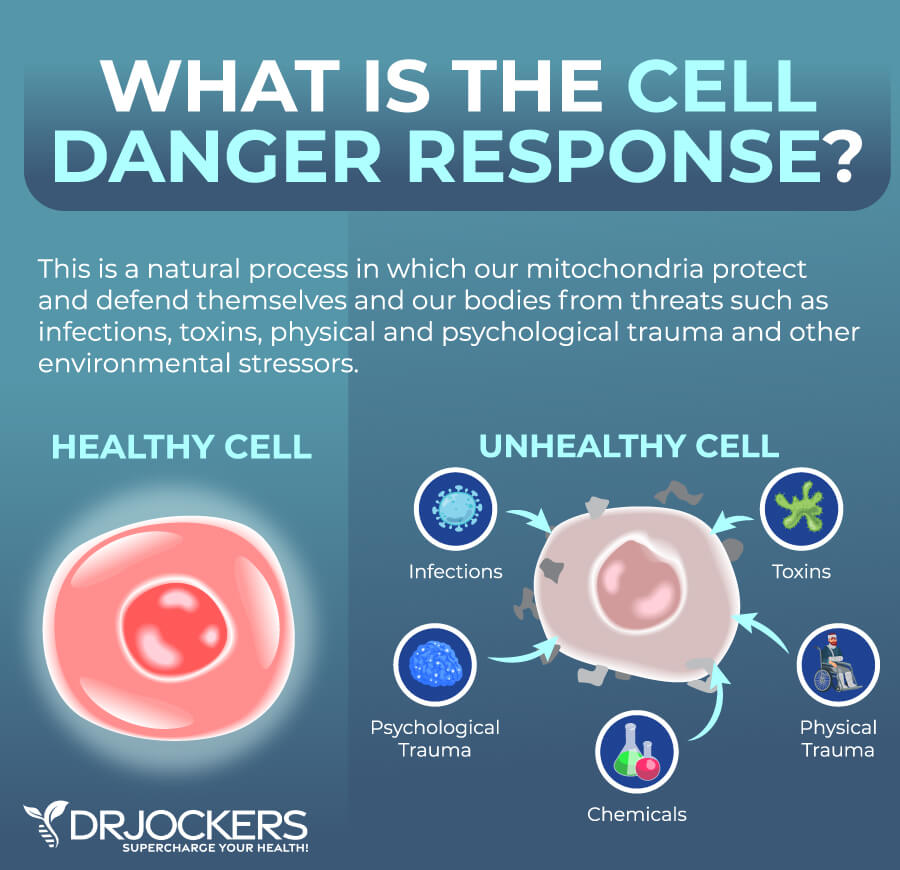
Symptoms of Low Libido
Symptoms of low libido may include:
- Low or a loss of sexual desire for a partner
- Low or no interest in sexual activities, including masturbation
- Having few or no sexual thoughts or fantasies
- Feeling concerned or stressed about your lack of interest in sex or lack of sexual activity or thoughts
Risk Factors for Low Libido
There are various factors that can increase your risk for low libido, including:
- Fatigue
- Pain during sexual intercourse
- Body image issues
- Self-esteem issues
- Pregnancy
- Relationship problems
- Low testosterone
- Depression
- Sleep problems
- Aging
- Stress
- Restless leg syndrome
- High blood pressure
- Diabetes
- Chronic pain or chronic illness
- Certain medications, especially certain antidepressants, chemotherapy, radiation, opioids, hormone therapy, blood pressure medications, and corticosteroids
- Smoking
- Excess alcohol consumption
- Drug use
- Overexercising
- Being sedentary
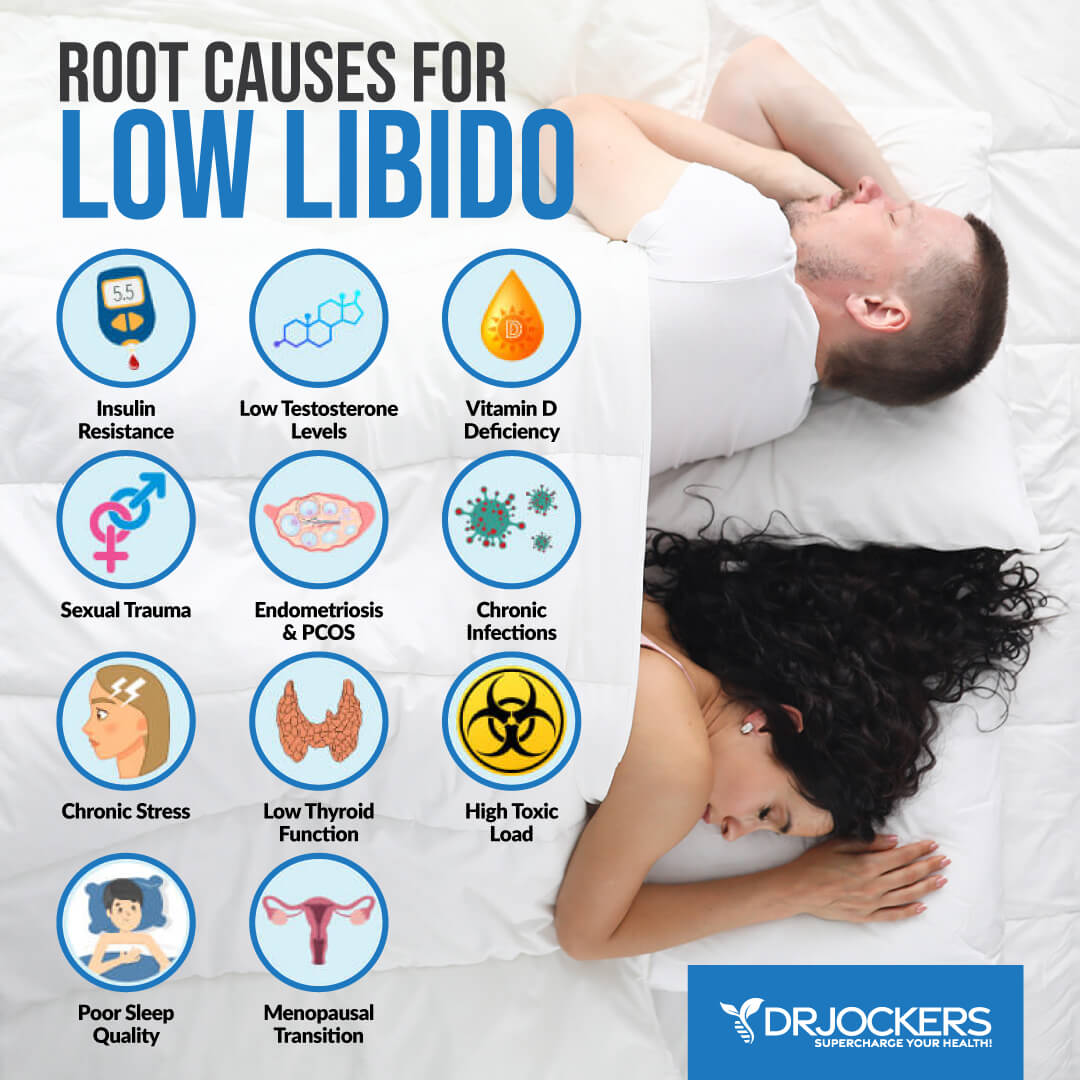
Root Causes Behind Low Libido
Now that you understand the risk factors for low libido, let’s learn about the root causes of low libido.
Insulin Resistance
Insulin resistance means that your body cannot respond to insulin as it should, and it’s unable to use blood glucose properly for energy. This means that your pancreas has to start making more and more insulin to keep up. Over time, this will make your blood glucose levels go up, leading to all kinds of problems. Insulin resistance can lead to blood sugar imbalances, prediabetes, diabetes, and all kinds of chronic health issues. It can also lead to low libido.
Insulin resistance and eating too much sugar can lead to decreased testosterone levels. Low testosterone levels can cause low libido and erectile dysfunction in men. A 2016 study published in the Journal of Clinical Diagnostic Research has found that erectile dysfunction and low libido are common in men with type 2 diabetes (5).
Insulin resistance can also increase the risk of leptin resistance. Leptin doesn’t just control your appetite and hunger but also monitors your sexual functions. According to a 1997 study published in Clinical Endocrinology, leptin resistance can lead to low testosterone levels, which may be linked to low libido as well (6). Furthermore, insulin resistance and too much sugar can also increase fatigue, insomnia, stress, and anxiety, which can contribute to lower libido as well.
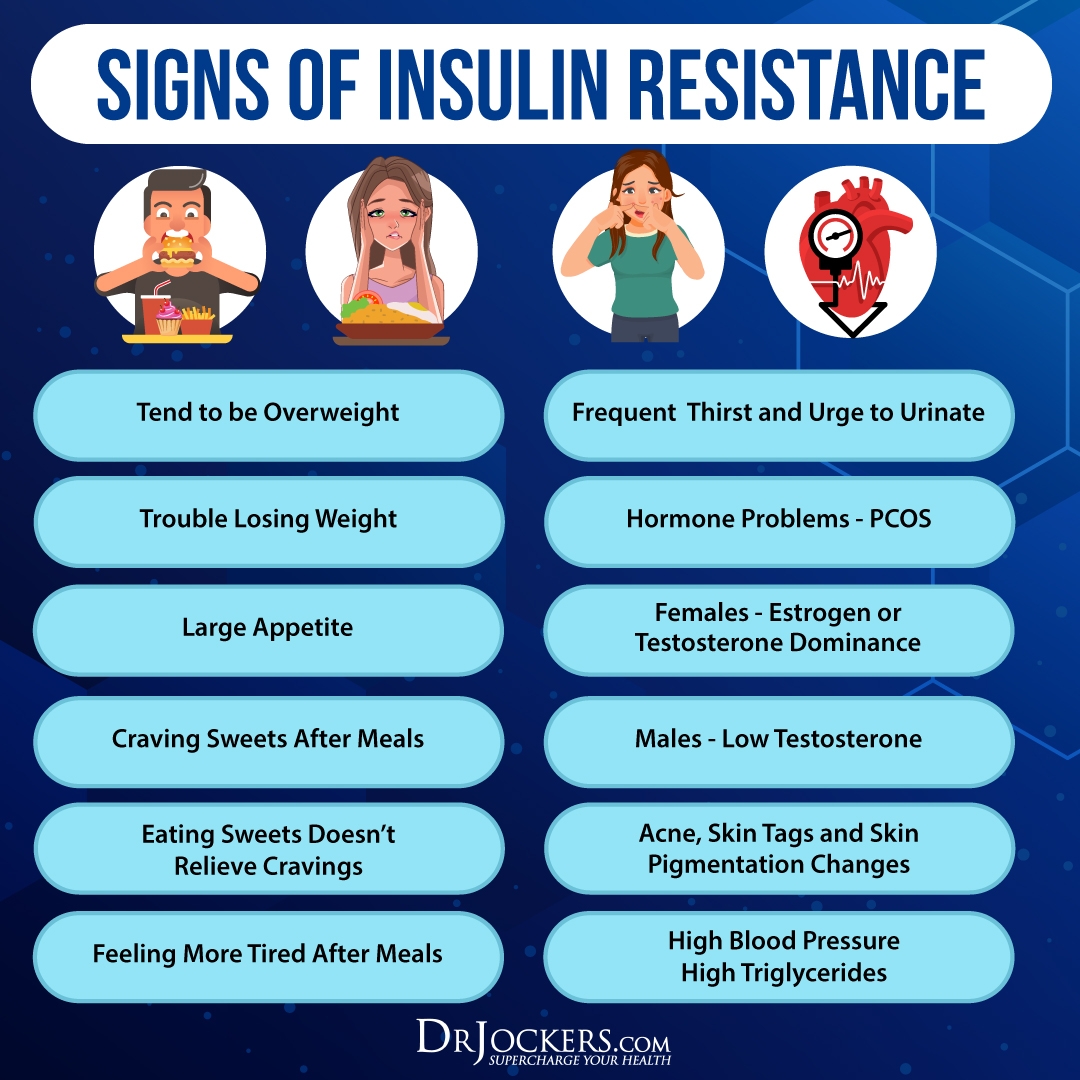
Sexual Trauma, Chronic Stress & Poor Sleep
It’s not just your physical health, but your emotional and mental well-being can also affect your libido. Sexual trauma, chronic stress, and poor sleep can all lower your libido. Sexual trauma, including harassment, assault, and rape, can have serious consequences on your libido.
A 2015 study published in the Egyptian Journal of Forensic Sciences found that out of 150 participants with a history of sexual violence experience, only 46 were sexually active (7). Out of the 46, 33 experienced low libido, difficulty having an orgasm, and other sexual dysfunction.
You don’t need major sexual trauma to experience low libido, though. Simply experiencing chronic stress and poor sleep is enough. A 2013 study published in the Journal of Sexual Medicine has found that chronic stress can lower sexual arousal in women (8).
According to a 2018 study published in the Archives of Sexual Behavior, stress is more likely to lower the libido of women than men (9). However, even if it is less likely to impact libido itself, stress and anxiety can cause worry about sexual performance, erectile dysfunction, or other sexual dysfunction in men.
Furthermore, according to a 2019 study published in the World Journal of Men’s Health, poor sleep, insomnia, restless leg syndrome, sleep apnea, and work shift disorder can increase the risk of low libido, erectile dysfunction, and sexual dysfunction (10). A 2015 study published in the Journal of Sexual Medicine has found that poor sleep can also negatively impact the sexual behavior, libido, genital response, and partnered sexual activity of women (11).
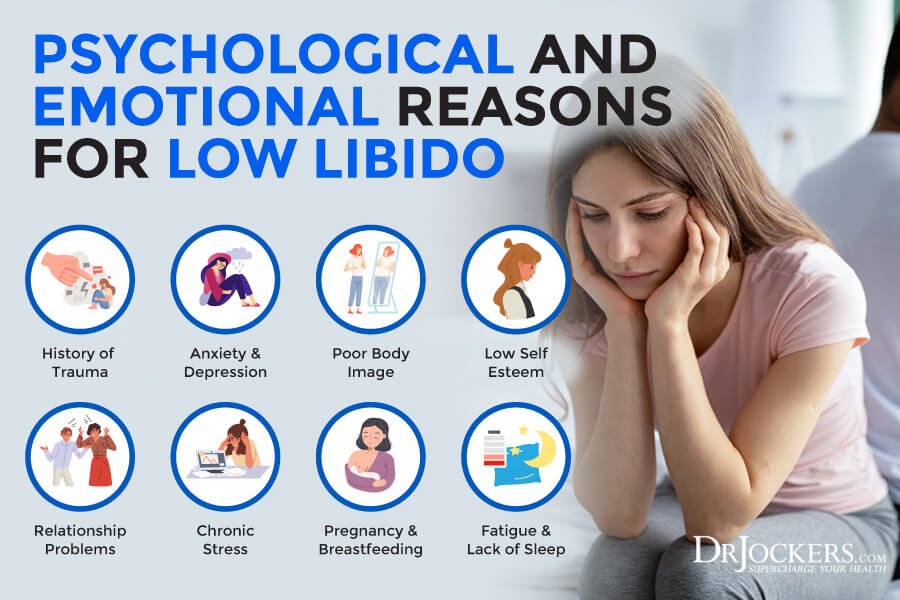
Low Testosterone Levels
As you’ve learned earlier, testosterone is a male sex hormone that is produced by both male and female bodies. It is more prominent in men and is mostly created by the testicles. It is critical for muscle strength, bone mass, sexual development, sperm production, and sexual function. Low testosterone levels can not only impact men, but also women, and lead to low libido.
A 2000 review published in Reviews in Urology has found that decreased testosterone with aging can increase the risk of erectile dysfunction (12). A 2017 study published in Current Opinions in Urology has found that testosterone therapy can improve libido and erectile dysfunction in older men (13).
While women have naturally lower testosterone levels, too low testosterone can affect their libido as well. A 2010 study published in Therapeutic Advances in Endocrinology and Metabolism has found that testosterone therapy can improve the libido of women as well (14).
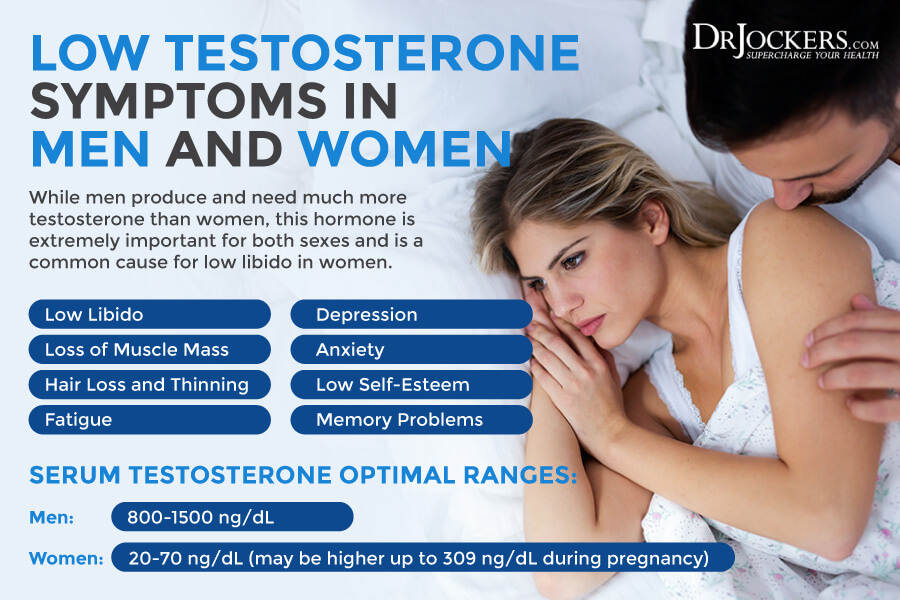
Endometriosis, PCOS, and Low Thyroid
Your libido is greatly impacted by your hormonal health. Endometriosis, polycystic ovarian syndrome (PCOS), and low thyroid levels can decrease your libido.
Endometriosis is a painful condition that impacts many women. Tissue that’s normally grown inside your uterus grows outside of it, impacting the ovaries, fallopian tubes, and the tissue lining of the pelvis.
It can impact your menstrual cycle and cause a lot of pain. Understandably, endometriosis can impact libido and sexual function. According to a 2020 review published in Facts, Views, and Vision in ObGyn, endometriosis can lead to problems with sexual function and relationship difficulties (15).
PCOS is a condition caused by hormonal imbalance and metabolic issues. It can cause menstrual irregularity, pain, acne, excess hair growth, and obesity. It can also lead to low libido. A 2019 study published in the Journal of Psychosexual Health has found that women with PCOS had lower sexual desire and more difficulties with sexual arousal (16).
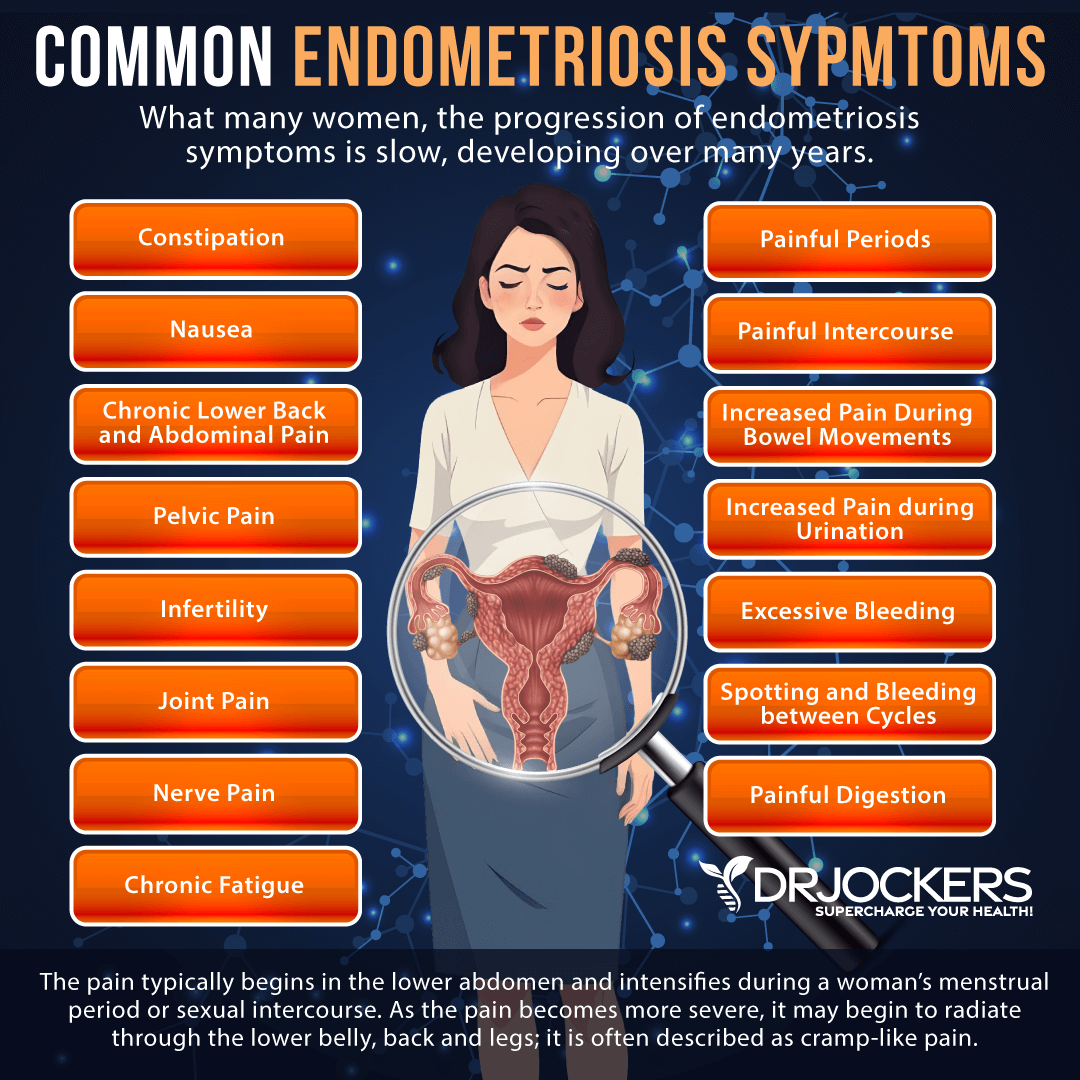
Your thyroid is a butterfly-shaped gland found at the bottom of your neck that produces your thyroid hormones. Problems with thyroid hormone production can impact your energy levels, digestion, weight, skin, hair, and more. It can also impact sexual function.
According to a 2019 review of clinical studies from 1978 to 1998 published in Sexual Medical Reviews, hypothyroidism (low thyroid) and hyperthyroidism (too much thyroid hormones) can both lead to low libido and problems with arousal, lubrication, orgasms, and sexual satisfaction in women (17).
The review has found that thyroid issues can also affect men’s libido. Hyperthyroidism may be linked to erectile dysfunction and premature ejaculation and hypothyroidism may cause erectile dysfunction and delayed ejaculation. The evidence that hypothyroidism can lower libido in men is mixed; however, some evidence suggests that both hypothyroidism and hyperthyroidism can cause low libido in men as well.
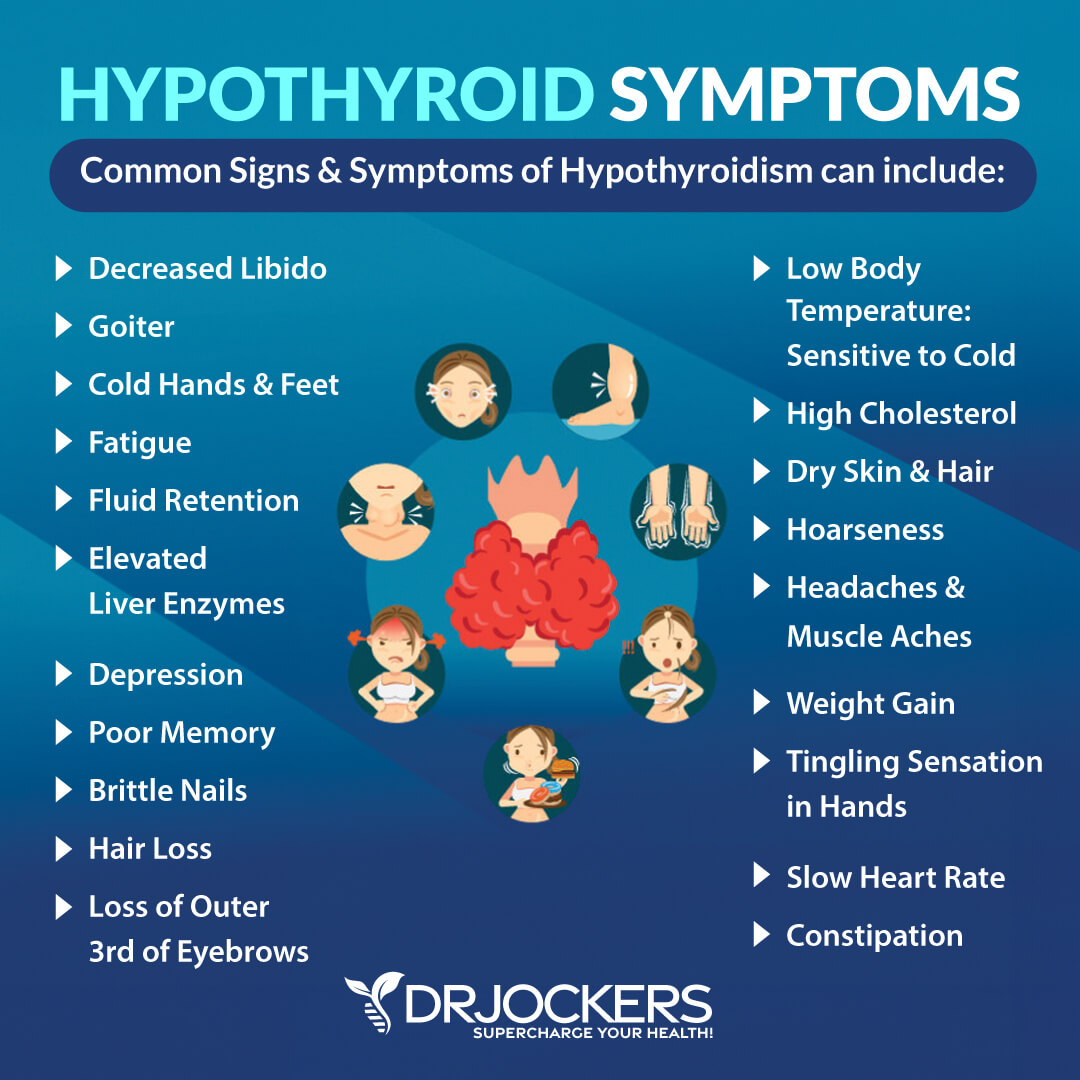
Menopausal Transition
Menopause marks the end of the menstrual cycle of women. Menopause is officially diagnosed once a woman has gone without a period for 12 months. It occurs on average at the age of 51. The transitional period before menopause is called menopause which can last for a few years or a decade is usually one’s 40s.
This is a time of hormonal transition that can also lower libido and affect sexual function. A 2008 study published in the Archives of Internal Medicine looked at 2207 women between 30 and 70 (18). Out of these women, 755 were in perimenopause, 552 were naturally menopausal, and 637 were surgically menopausal. They found that 26.7 percent of perimenopausal, 52.4 percent of naturally menopausal, and 12.5 percent of surgically menopausal women had low libido.
A 2000 study published in The Permanente Journal has found that low libido, difficulty with orgasms, and lower frequency of sex are connected to a variety of factors (19). These factors may include biological factors, such as lower testosterone and hormonal changes, mental and emotional issues, such as depression and other psychiatric illnesses, cultural issues, such as societal attitudes towards aging and older women, and interpersonal problems, such as relationship issues.
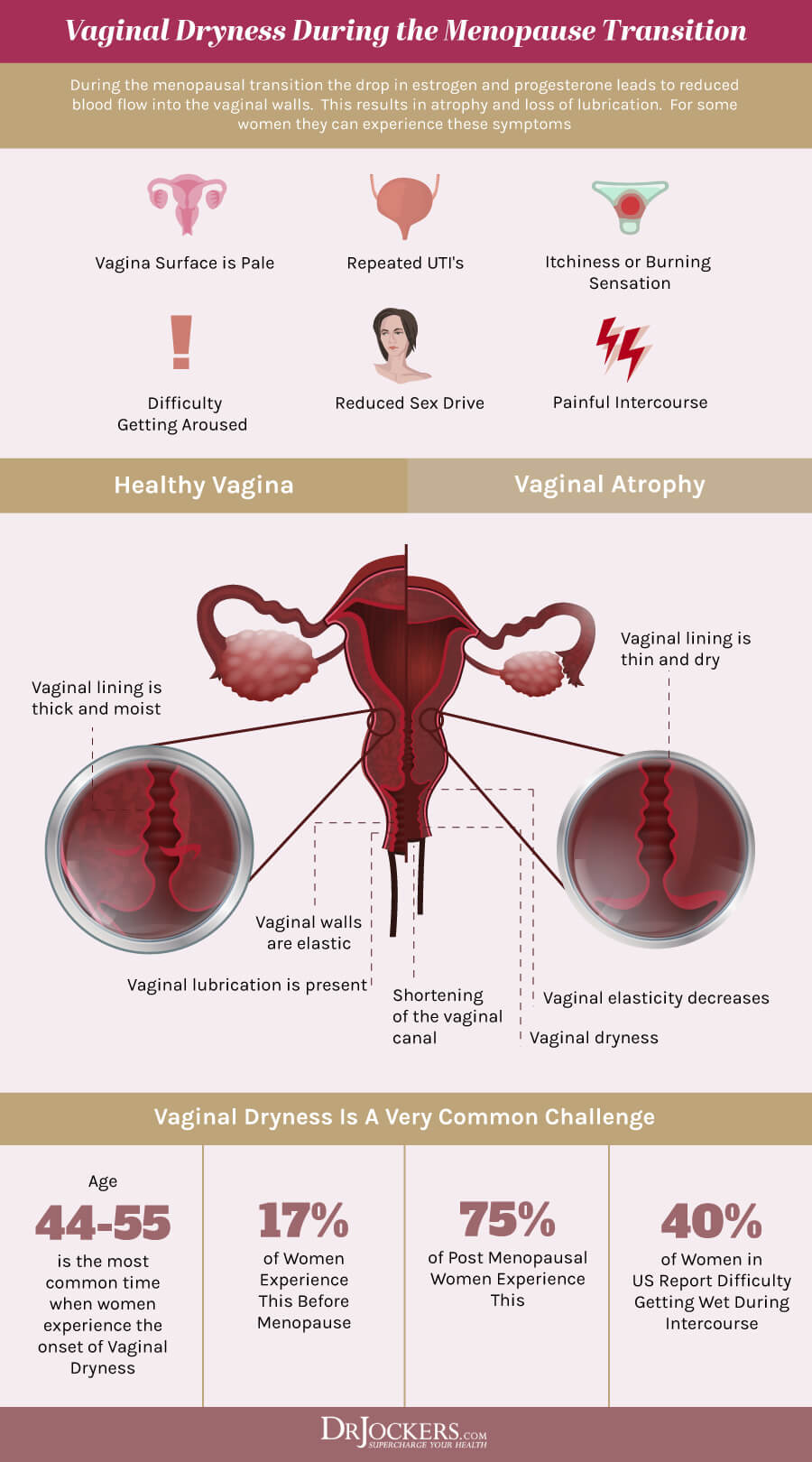
Vitamin D Deficiency
Did you know that even sunshine can affect your libido? Sunshine, or rather ultraviolet rays hitting your skin, triggers vitamin D synthesis. You can also get vitamin D from a few foods and supplements. Vitamin D is not only critical for your bone, immune, mental, and cardiovascular health but also your sexual health. Vitamin D deficiency can cause low libido.
A 2016 study published in the European Journal of Obstetrics, Gynecology, and Reproductive Biology has found that vitamin D deficiency can lead to depression, low libido, lower chance of orgasm, and lower sexual satisfaction in young women (20). On the upside, a 2018 study published in Endokrynologia Polska has found that vitamin D supplementation can help with sexual function and symptoms of depression in young women (21).
A 2018 study published in the International Journal of Impotence Research has found that vitamin D deficiency can cause lower sexual function and depressive symptoms in men as well (22). A 2020 systematic review and meta-analysis have found that vitamin D deficiency can also cause erectile dysfunction in men (23).
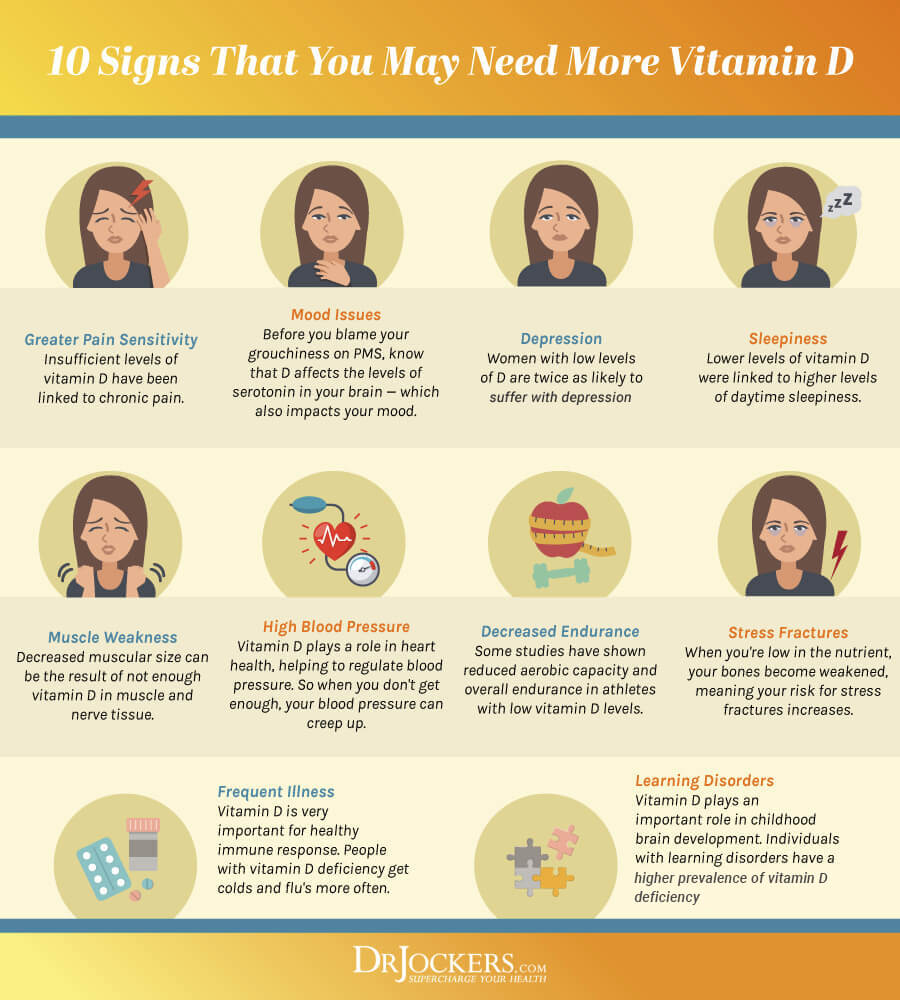
Chronic Infections
We’ve discussed earlier in this article how a CDR can cause low libido. One of the major causes of CDR is physical stressors, including injuries, surgeries, and major infections. When your body encounters an infection, it will trigger a CDR. This is a normal part of your body’s natural defense mechanism against threats. Under normal circumstances, however, this is short-term. Within a few days or weeks, your body should recover from an infection.
However, when an infection is chronic, it can become a serious problem leading to a chronic CDR, chronic inflammation, chronic symptoms, and chronic illnesses. A 2019 study published in Current Sexual Health and Reproduction has found a link between inflammation, low libido, and sexual arousal in women (23).
A 2003 review published in the American Family Physician has found that chronic illness, including HIV infection, can affect sexual function (24). A 2020 study published in the Journal of Medicine and Life has found that frequent vaginal infections, such a Candida and Gardnerella, are a common culprit in low sexual function (25).
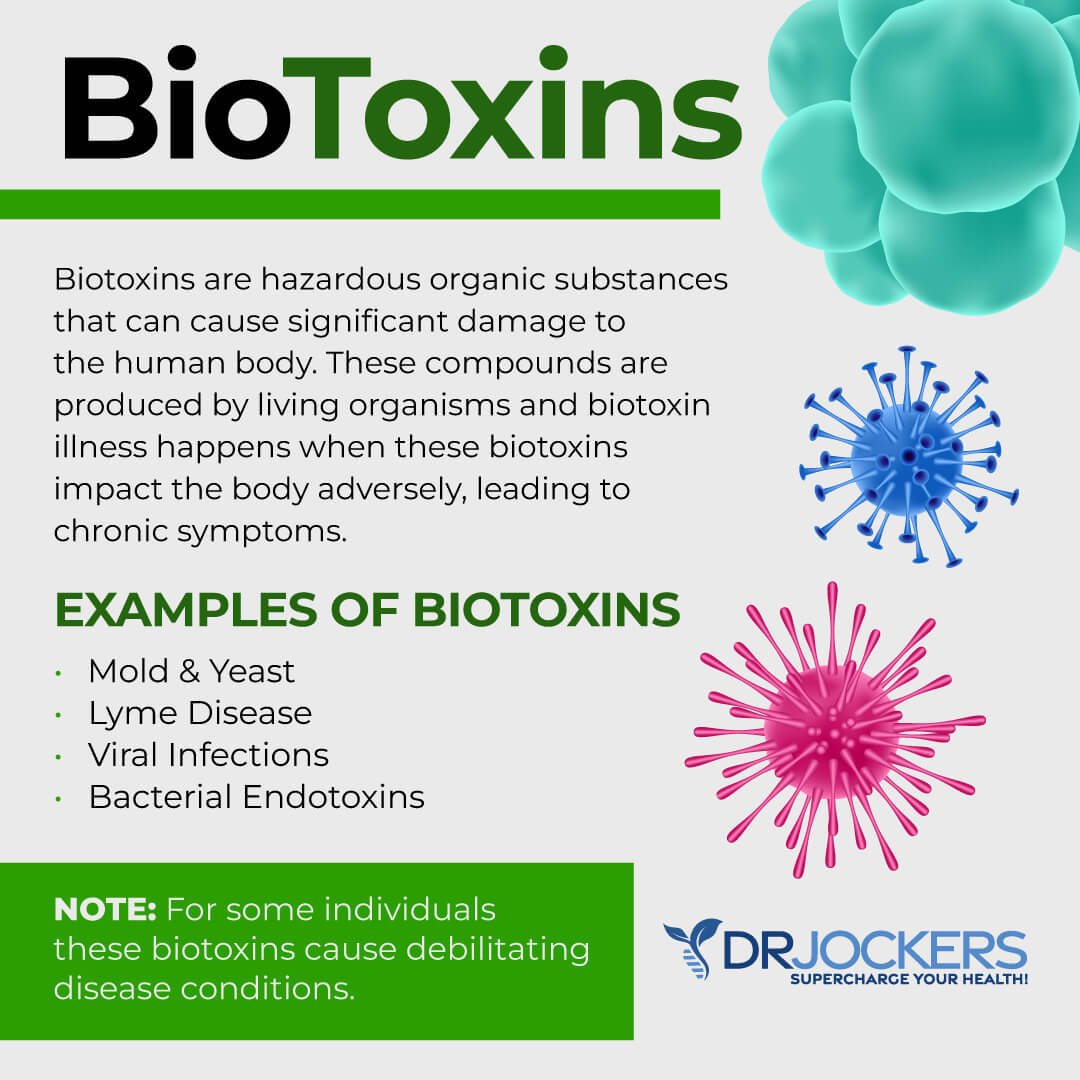
High Toxic Load
Another common culprit behind CDR and hormonal imbalance is chronic exposure to toxins, mold, heavy metals, and xenoestrogens. According to a 2020 review published in Mitochondrion, chemical pollutants and toxins can decrease the CDR activation threshold (27).
A 2019 study published in JBRA Assisted Reproduction has found that environmental toxins and endocrine-disrupting chemicals can negatively impact female reproductive health (28). A 2017 animal study published in the International Journal of Environmental Research and Public Health has found that exposure to methylmercury can cause sexual dysfunction (29).
According to a 2014 study at the University of Michigan, exposure to high levels of phthalates, a chemical found in plastic and some personal care products, can lead to lower levels of testosterone (30). As you know, low testosterone can cause low libido. A 1998 review published in The Journal of Steroid Biochemistry and Molecular Biology has found that endocrine-disruptor chemicals and xenoestrogens can lead to low libido and lower sperm count (31).
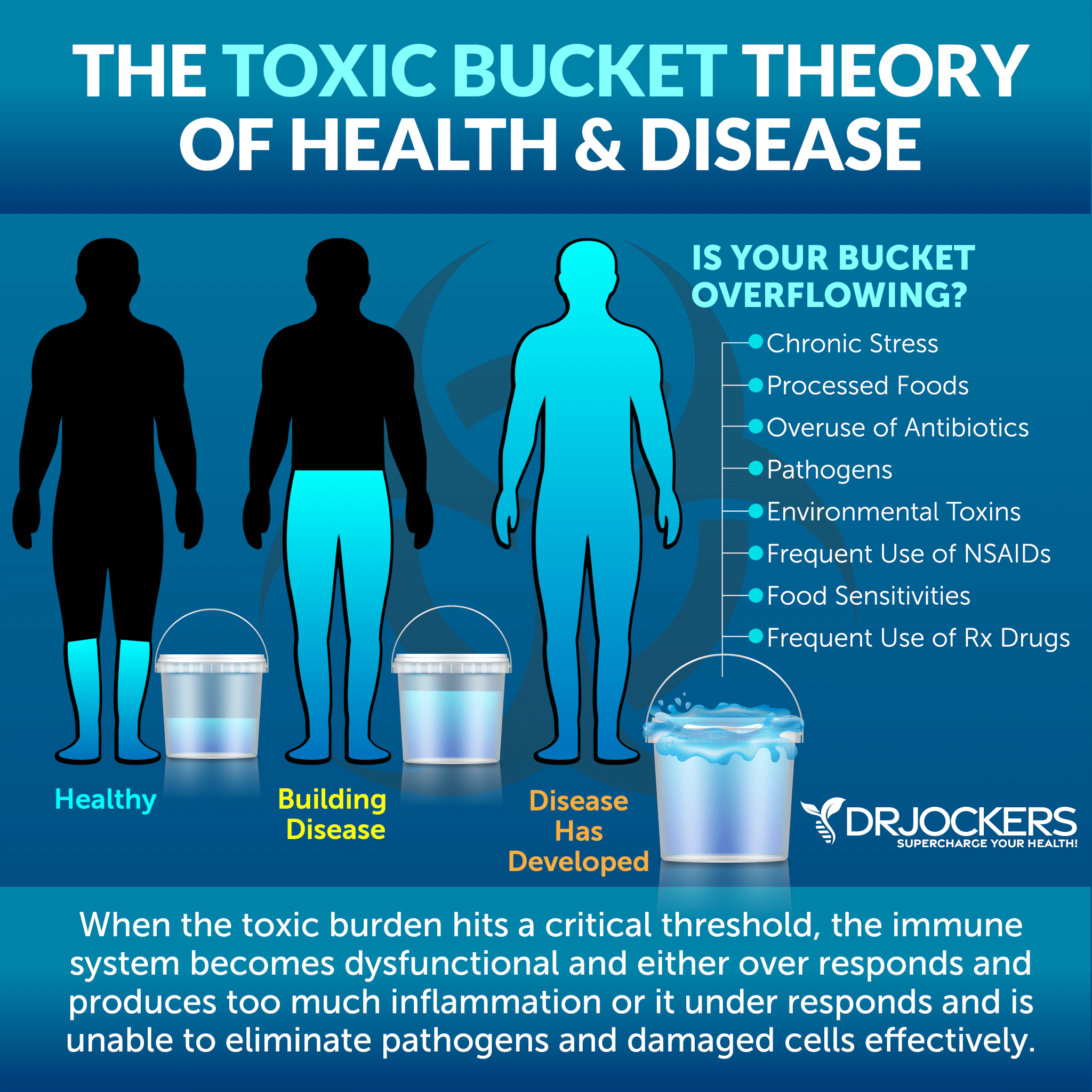
Natural Support Strategies for Healthy Libido
A healthy libido is important for your physical, mental, emotional, and social well-being. Here are my top natural support strategies for a healthy libido.
Anti-Inflammatory Nutrition Plan
A 2019 review published in Current Sexual Health and Reproduction has found that an anti-inflammatory diet can help to improve sexual desire and arousal (31). I recommend that you remove inflammatory foods, including refined sugar, refined oils, artificial ingredients, additives, junk food, and highly processed foods.
Choose organic whenever possible. Eat an anti-inflammatory diet rich in greens, vegetables, sprouts, herbs, spices, nuts, seeds, low-glycemic index fruits, grass-fed beef and butter, pasture-raised poultry and eggs, wild-caught fish and seafood, and wild game.
I recommend eating a higher protein diet to improve testosterone. Eat lots of healthy fats, including avocadoes, coconut oil, grass-fed butter and ghee, MCT oil, nuts, and seeds. For their libido-enhancing properties, I recommend lots of avocados, berries, cherries, cacao, and some organic, extra-dark chocolate.
For increased dopamine, I recommend cacao and dark chocolate, almonds, walnuts, fish, and eggs (2). I recommend wild-caught salmon for anti-inflammatory omega-3 fatty acids, oysters for zinc, grass-fed beef for protein, iron, carnitine, and vitamin B12, and celery and cucumbers for electrolytes and hydration.
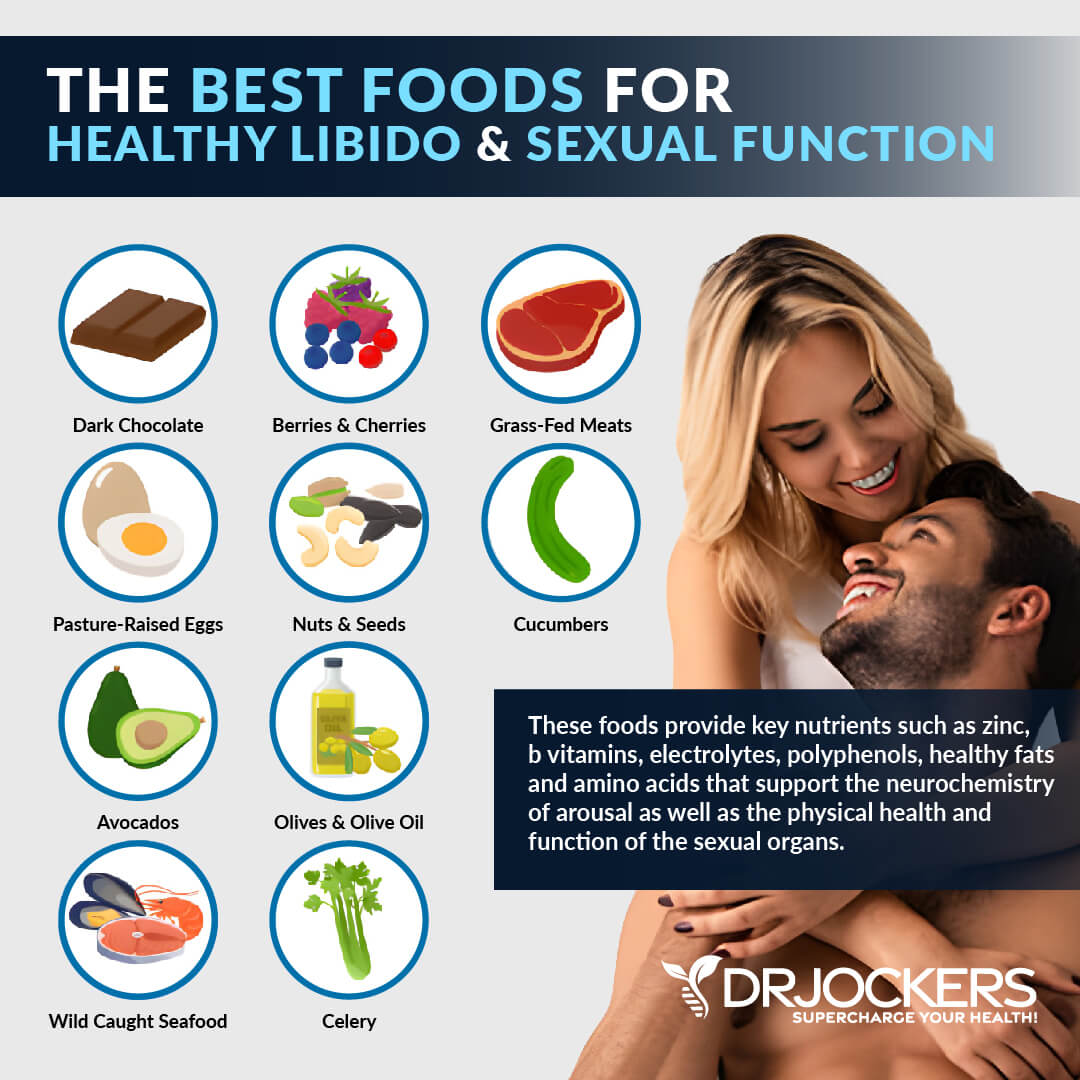
Intermittent Fasting
Intermittent fasting is a way of eating that cycles between a period when you are fasting (not eating) and a period of feasting (a window for your meals and eating) within one day. Intermittent fasting offers many benefits from better insulin sensitivity, lower inflammation, and improved cellular repair and function. It may also help libido and sexual health. A 2020 study published in Urology has found that intermittent fasting and an organic diet may improve erectile function (33).
If you are new to intermittent fasting, I recommend that you start with the Simple Fast. It involves 12 hours of fasting, including your overnight sleep. Gradually increase your fasting window until you reach your sweet spot. Most people feel the best with a 16-hour window. You may learn more about intermittent fasting and the best strategies in this article.
Women, especially menstruating females, have to be careful so intermittent fasting doesn’t affect their menstrual cycle. For women, I recommend Crescendo Fasting. You may learn about it here. I also recommend checking out my article on feast/famine cycling for optimizing the menstrual cycle.
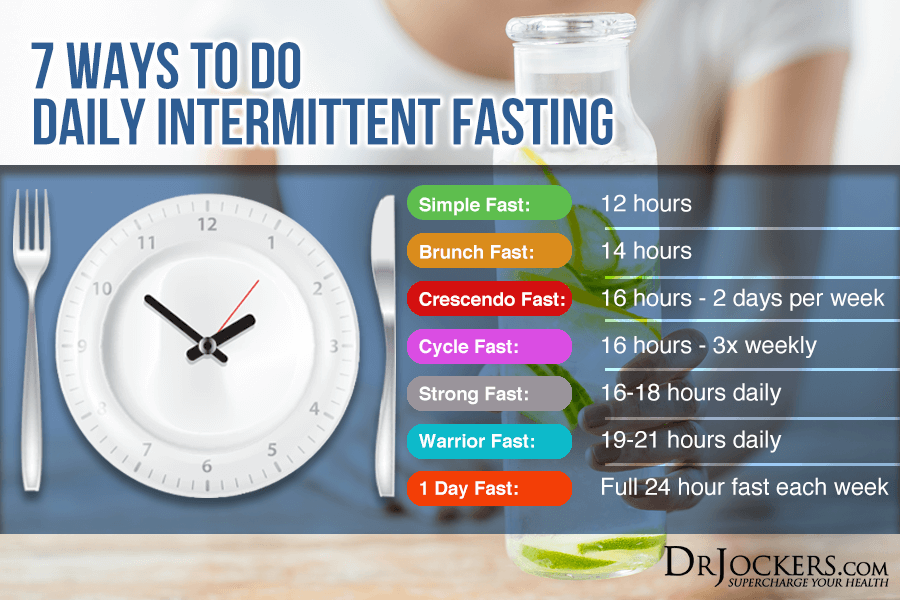
Reduce Stress & Optimize Sleep
As you’ve learned earlier in this article, chronic stress and poor sleep can cause low libido and poor sexual function (8, 9, 10, 11). Reducing stress and optimizing sleep is critical for your sexual health.
Avoid stressful situations and people that bring you down as much as possible. Stop scrolling social media and checking the news all day long. Practice mindfulness, meditation, breathwork, visualization, and gratitude. Try journaling to release negative feelings and spot thought processes that don’t serve you well.
Practice positive mindset shifts, positive affirmations, and positive self-talk. Spend time in nature. Surround yourself with uplifting and supportive people. Have some designated time for yourself and for self-care.
Develop a relaxing evening routine that calms you down and gets you ready for sleep. Avoid electronics, sugar, heavy food, and alcohol in the evening. Try relaxing activities, including taking a bath, reading fiction, poetry, or scripture, crossword puzzles, journaling, coloring, drawing, puzzles, and meditation. Create a safe and relaxing sanctuary in your bedroom with a supportive mattress, comfortable bedding and pillows, relaxing essential oils, dim lights, and blackout curtains.

Regular Movement & Exercise
Leading a sedentary lifestyle can affect your libido. A 2018 study published in the Journal of Education and Health Promotion has found that physical fitness can improve sexual functioning (34). Exercise can also reduce stress and improve your mood, which can benefit your libido as well.
To improve your libido, I recommend that you move your body daily and exercise regularly. Strength and resistance training is particularly important for testosterone optimization for both men and women. Bodyweight exercise, free weights, weight machines, resistance bands, kettlebell training, TRX suspension trainers, and CrossFit all are all great ideas.
High-intensity interval training (HIIT) is a great way to combine strength and resistance training and cardio in one short workout. Pilates, yoga, and Barre workouts are low-impact workouts that strengthen and lengthen your muscles.
While regular exercise is important, it’s critical that you don’t overtrain your body either. Too much exercise can also cause low libido. A 2017 study published in Medicine and Science in Sports and Exercise has found that intense endurance training can reduce libido in men (35).
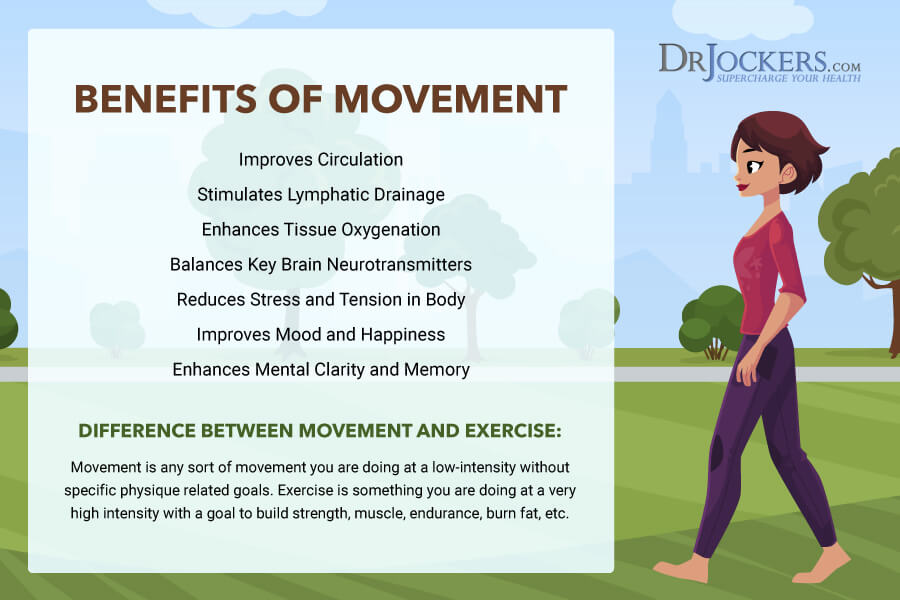
Improve Oxytocin Levels
As you’ve learned earlier, oxytocin can improve your libido. But increased oxytocin is not only good for your libido, but your partner’s too. An interesting 2017 study published in Fertility and Sterility has found that giving females intranasal oxytocin has benefited their male partner’s sexual desire and response, too, including their erectile function (36).
Great ways to improve your oxytocin include meditation, yoga, getting a massage, random acts of kindness, playing with dogs or pets, connecting with friends and loved ones, emphatic listening, deep conversations, volunteering, cooking, and having sex. Eating fatty fish, nuts, seeds, avocadoes, spinach, mushrooms, peppers, and tomatoes can also help to boost oxytocin, as can vitamin D, magnesium, and vitamin C.
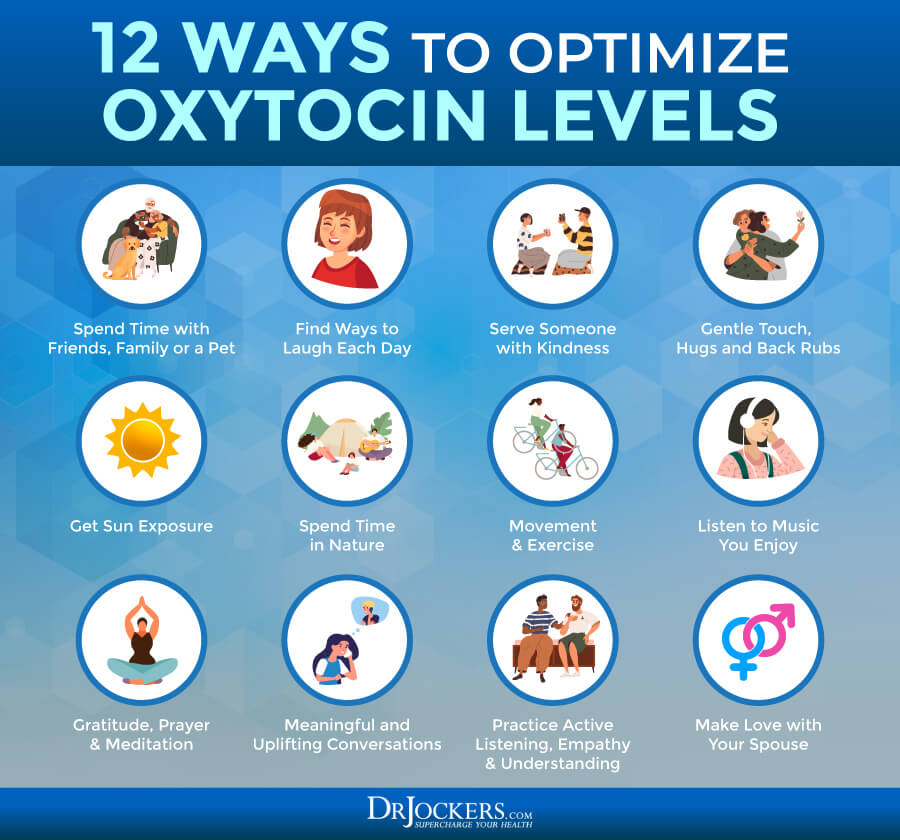
Optimize Vitamin D Levels
I recommend optimizing your vitamin D levels for improved libido. A 2017 study published in Aging Male has found that vitamin D can help sexual hormonal health and erectile function (37). A 2018 study published in Endokrynologia Polska has found that vitamin D supplementation can help with sexual function and symptoms of depression in young women (21). A 2018 study published in the International Journal of Endocrinology has found that vitamin D can improve testosterone and erectile function (38).
To optimize your vitamin D levels, I recommend spending time out in the sun and eating vitamin D-rich fatty fish, egg yolks, and beef liver. However, sunshine and food are not enough. I recommend daily supplementation with vitamin D3.
Pairing vitamin D3 with vitamin K2 helps improve calcium absorption and inflammation control. I recommend taking a vitamin D3 supplement with at least 3,000-5,000 IU’s of vitamin D3 and at least 90 mcg of vitamin K2. I highly recommend Vitamin D3/K2 Power. Both of these supplements support your immune, skin, cardiovascular, and bone health.
Typically, taking 1,000 IU per 25 lbs. of body weight will help you get your levels into a healthy range. You want to test your vitamin D levels at least 1-2 times each year and get your levels between 50-100 ng/ml. It has been hypothesized that a therapeutic level for major health conditions is going to be between 70-100 ng/ml.
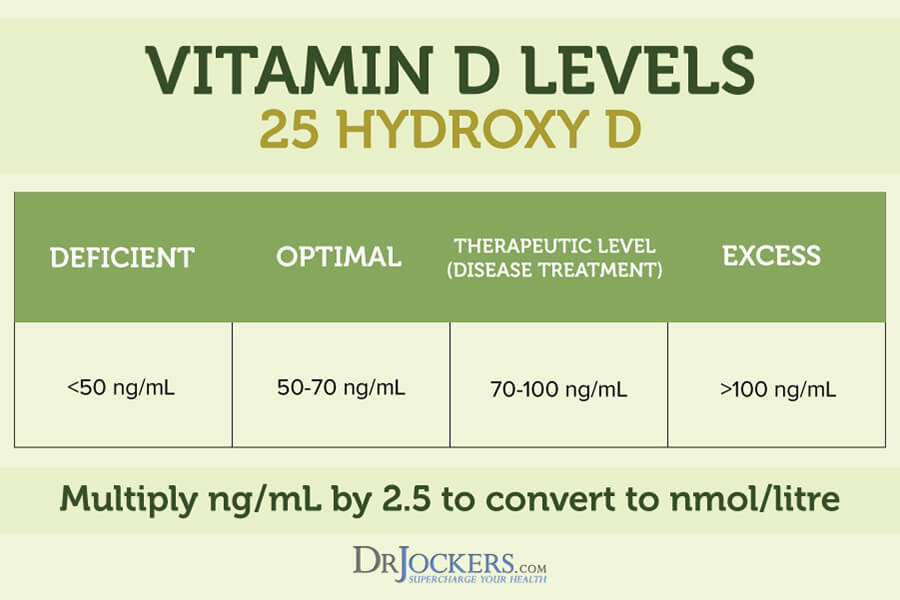
Optimize Zinc Levels
I recommend optimizing your zinc levels for improved libido. A 2011 study published in Biological Trace Element Research has found that poor zinc levels and poor zinc/copper ratio can be linked to lower testosterone levels (39). A 2021 randomized controlled trial published in the Journal of Sex & Marital Therapy has found that zinc can improve testosterone levels and sexual function in postmenopausal women (40).
I recommend that you consume plenty of zinc-rich foods, including meat, poultry, and seafood. Additionally, I recommend daily zinc supplementation, such as Zinc Charge.
We test plasma zinc and serum copper levels and the ideal ratio is roughly 1-1.2, meaning you should have equal or slightly higher levels of plasma zinc than you have serum copper. Fortunately, the foods that are high in zinc, such as meat, seafood, nuts, and pumpkin seeds are also very high in copper so you get both of these together in your diet.
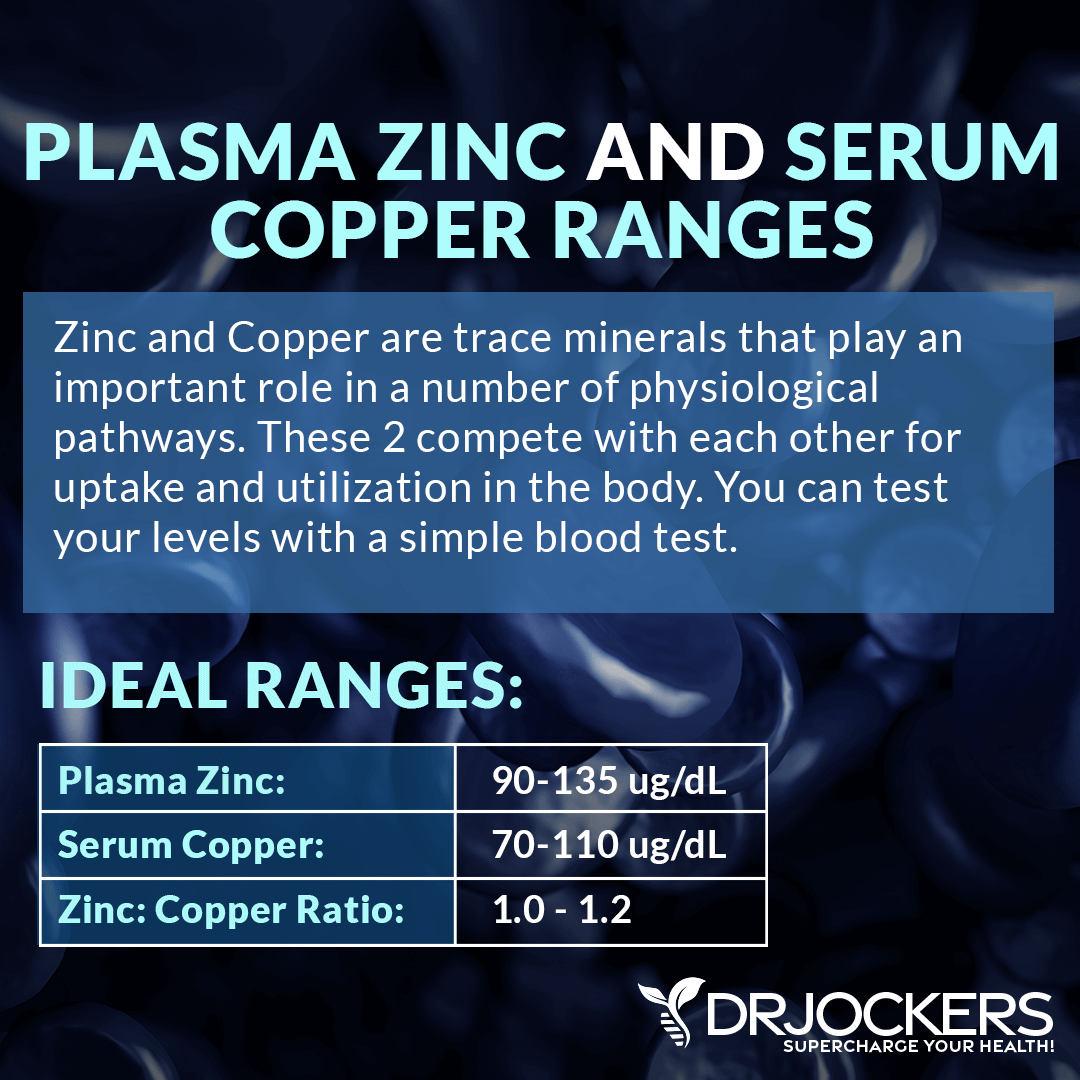
Herbs That Support Libido
There are several herbs I recommend to support your hormonal health and libido, including:
Maca
A 2009 randomized, double-blind clinical trial published in Andrologia has found that maca can improve sexual performance in men with mild erectile dysfunction (41). A 2010 systematic review of randomized clinical trials published in BMC Complementary and Alternative Medicine has also found that maca can improve sexual function in both men and women (42).
Tribulus
A 2017 prospective, randomized, double-blind, placebo-controlled clinical trial published in Maturitas has found that Tribulus Terrestris may be safe and effective for sexual dysfunction in men (43). A 2021 comprehensive review published in Phytomedicine has found that Tribulus may be beneficial for the female reproductive system as well.
Thanks to the presence of a steroidal saponin compound and secondary metabolite, protodioscin, Tribulus may help to improve ovarian health, PCOS symptoms, breast health, and sexual desire in postmenopausal women (45).
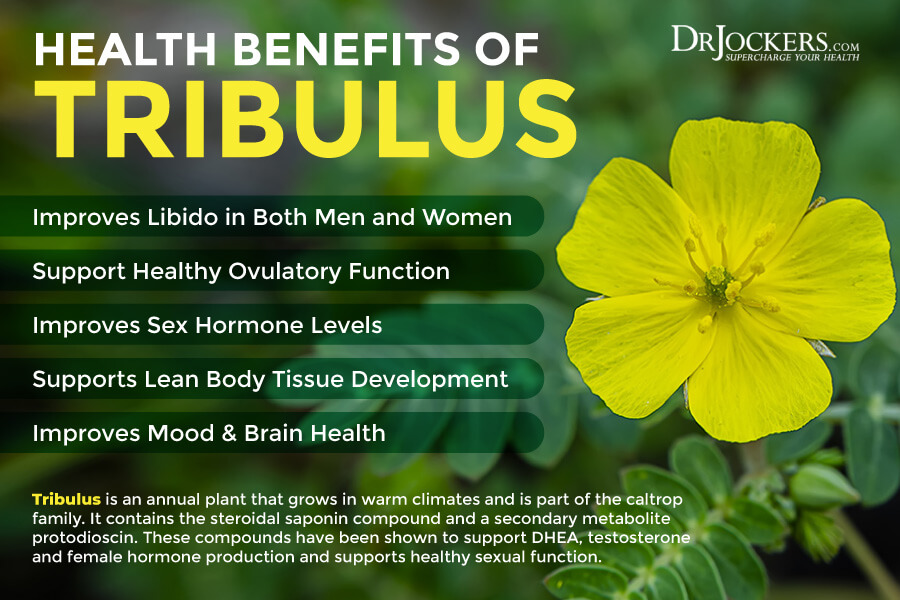
Horny Goat Weed
Horny goat weed didn’t get its name on accident. A 2006 study published in the Asian Journal of Andrology has found that horny goat weed can mimic testosterone (46). A 2008 randomized controlled trial published in Phytotherapy Research has found that it can improve estrogen levels in postmenopausal women (47).
A 2010 study published in the Journal of Sexual Medicine has found that horny goat weed may improve erectile dysfunction (48). A 2020 study published in Dose-Response has found that it can also improve hormonal health in men (49). The active ingredient Icariin acts as a phosphodiesterase inhibitor which blocks the effects of an enzyme that restricts blood flow to the penis. This allows for easier and longer lasting erections.
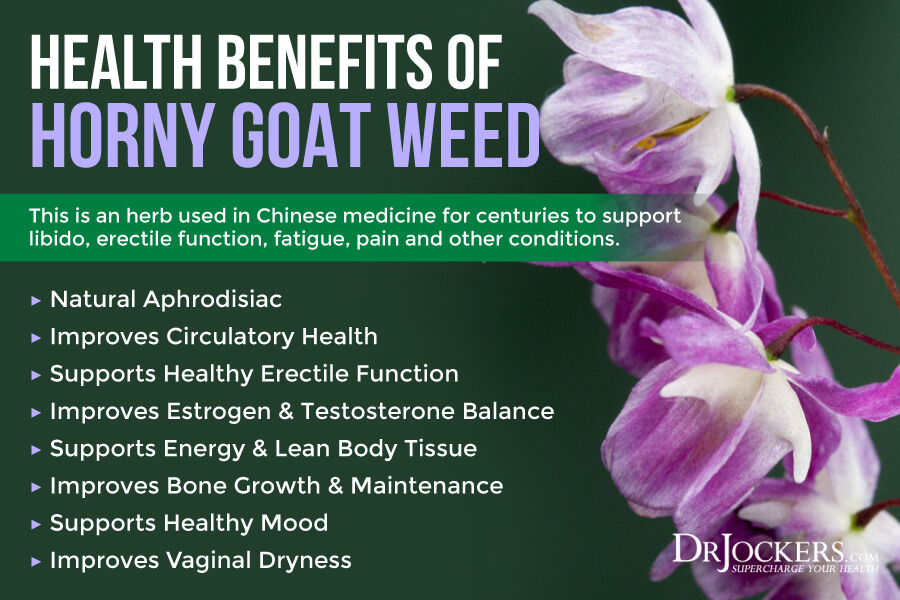
Ginkgo Biloba
A 1998 study published in the Journal of Sex & Marital Therapy has found that Ginkgo Biloba may help to improve sexual dysfunction caused by antidepressants (50). A 2014 study published in the Iranian Journal of Nursing and Midwifery Research has found that Ginkgo Biloba may help to improve libido in postmenopausal women (51).
Chrysin
A 2012 animal study published in Andrologia has found that chrysin may help to improve male reproductive health (52). A 2003 study published in the Journal of Medicinal Food has found that chrysin may help to improve testosterone levels in men (53).
Tongkat Ali
A 2017 review published in the Chinese Journal of Natural Medicine has found that Tongkat Ali may support male sexual health (54). 2019 research published in Evidence-Based Complimentary and Alternative Medicine has found that Tongkat Ali may improve sexual health, testosterone levels, erectile function, and prostate health in men (55).
Male Performance
For men, I recommend Male Performance. This blend combines organs, glands, and superfoods designed specifically for men’s performance and vitality. That means bovine and ovine liver, heart, adrenals, prostrate, orchic (testicular), pituitary, and more.
You’ll also get organic cordyceps and fenugreek seeds – both time-tested superfoods for men’s health – 10mg zinc, and 100mcg selenium. Together, this formula delivers powerful support to help men feel energized, youthful, and ready for their best years yet. This supplement helps provide safe support for normal testosterone production, erectile function, and desire.
Women’s Vitality
For women, I recommend Women’s Vitality. This blend combines organs, glands, and superfoods designed specifically to support women’s liver, thyroid, and adrenal health.
That means bovine and ovine liver, adrenals, thyroid, mammary, placenta, uterus, and more. You’ll also get organic spirulina, chaga extract, holy basil, and beetroot – all time-tested superfoods for women’s health – plus vitamins K2, D3, B12, and iron.
Together, this formula delivers powerful support to balance hormones, promote healthy aging, and help women thrive. This provides safe enhancement for natural testosterone production, optimization of testosterone and estrogen metabolism, and increased blood flow and adrenal support.
This product is designed to help provide an overall increase in desire and sexual satisfaction, specifically for women. As a dietary supplement, take two capsules per day, or as directed by your health care practitioner.

Final Thoughts
Your libido is your sexual drive and desire. It can be affected by a variety of factors including your hormonal health, brain function, and stress levels. Low libido can lead to relationship and personal frustrations and interfere with your quality of life. To keep your libido healthy and sexual health happy, I recommend that you follow my natural support strategies for low libido.
If you want to work with a functional health coach, I recommend this article with tips on how to find a great coach. We do offer long-distance functional health coaching programs. For further support with your health goals, just reach out and our fantastic coaches are here to support your journey.
Inflammation Crushing Ebundle
The Inflammation Crushing Ebundle is designed to help you improve your brain, liver, immune system and discover the healing strategies, foods and recipes to burn fat, reduce inflammation and Thrive in Life!
As a doctor of natural medicine, I have spent the past 20 years studying the best healing strategies and worked with hundreds of coaching clients, helping them overcome chronic health conditions and optimize their overall health.
In our Inflammation Crushing Ebundle, I have put together my very best strategies to reduce inflammation and optimize your healing potential. Take a look at what you will get inside these valuable guides below!





Great article Dr. Jockers! I’m currently struggling with this much to the disappointment of my husband. I’m glad you mentioned breastfeeding as a cause, as I am currently breastfeeding our 8 month old and have absolutely no libido, and haven’t had any since she was born. Hopefully after she’s weaned, and my hormones regulate themselves, it will return.
Thank you again!
Yes this is a very common issue!